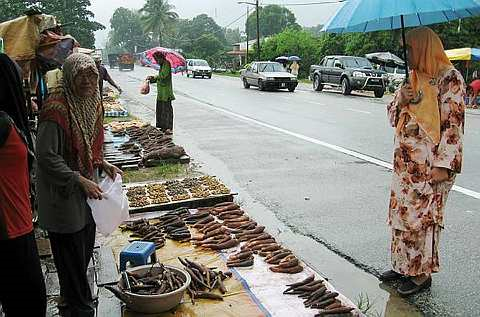Sabah under Umno has been riding the boom years with impunity but the global financial crisis means it will now have to re-order its priorities.
THE best-laid plans – such as my own to start covering Indonesia – are there to be upended, and sure enough I’ve had to dash up to Sabah for the past week or so.
Previously, the journey from Jakarta to Kota Kinabalu would have involved a change of flight in either Kuala Lumpur or Singapore.
However, this time I was able to take an AirAsia flight that whisked me from Jakarta’s Soekarno-Hatta airport directly to KK, arriving in the Land Below the Wind some two-and-a-half hours after departure, saving me at least four to five hours.
As chance would have it, my visit coincided with a close friend’s 60th birthday party and wedding anniversary.
Having spent a number of years in KK in the early 90s, plunging into the hotel ballroom was like stepping back in time, enveloped in the welcoming embrace of old friends.
I should add that in Sabah (as with most smaller and more isolated communities) friendship is taken very seriously.
Here, people remember and honour kindness. People also make time for one another, and life is celebrated.
There is no doubt in my mind that Sabahans appreciate those who make the effort to understand the state’s distinctive socio-cultural mix, because Sabah isn’t – nor will it ever be – a carbon copy of the peninsula.
For example, many Sabahans are very unhappy about the dismissiveness with which their identities as Kadazandusun, Rungus or Murut are dealt with by officialdom.
They dislike being defined merely as “Others” despite being themselves bumiputras.
Such off-handedness can be deeply insulting.
As a west Malaysian Malay, I’ve always felt that national level Umno leaders have failed to grasp these nuances.
They tend to assume that Sabahans (especially Muslim Sabahans) have seen the light and become fervent believers in Umno’s cause as well as its brand of politics.
To my mind the reality is more prosaic because in Sabah, Umno is really spelt ‘M-O-N-E-Y’, and lots of it – cascading out of the countless infrastructure and development projects that are currently altering the state’s landscape.
Here in the Land Below the Wind, the politics as practised by Umno is almost entirely transactional.
In this respect the party’s internal polls with its ketuanan melayu rhetoric have actually magnified the problems.
There’s been little attempt to make Umno relevant either culturally or socially unlike in Johor, for example, where the party truly reflects the underlying parameters of Malay society.
Indeed, Sabah artist Yee-I Lan would argue that Umno has been an integral part of the homogenisation of the Sabah Muslim identity, as Bajau, Orang Laut and Suluks are reduced to being just “Malays”.
She says: “This process is not unlike what’s happened with palm oil. It’s a mono-crop that has wiped out local communities and shattered their connection with the land.
“Nowadays when we celebrate the Harvest Festival in Sabah we’ve lost the essence of what it’s about – namely, the ‘connectedness’ to the land.”
While the “Sabah Umno” model has been pretty effective to date (and the Chief Minister Datuk Musa Aman is clearly the most practised and savvy proponent) I don’t think it’s deeply rooted.
The unwillingness to acknowledge the differences that exist between the peninsula and the north Borneo state means that Sabahan aspirations remain sidelined.
That’s not to say that Datuk Seri Anwar Ibrahim has a coherent Sabah strategy. Indeed, Pakatan Rakyat is equally peninsula-centric.
Still, the state’s “transactional” political culture means that loyalty can be hard to sustain and if things start going wrong economically, a reversal in fortunes could be swift.
Nonetheless, back in February, when I last passed through Sabah for my election coverage, the state had been booming: CPO prices were well above the RM3,000 per tonne level, tourism arrivals look set to break the 2.4 million mark and federal money was pouring in, courtesy of the latest development corridor.
Moreover, Sabah’s east coast towns such as Tawau, Lahad Datu and Sandakan were experiencing a long-awaited boom reminiscent of the Timber heydays of the 60s and 70s.
Ten months later, the mood is very different.
Thomas More Willie, the general manager of Kota Kinabalu’s Beverly Hotel, is frank.
“There’s no way we’re not going to be impacted by the financial crisis. People who’ve booked and paid for their holidays will go ahead,” he says.
“Fresh bookings will be tougher to come by. With the collapse of the Korean won, clearly that market will be down and there are 11 flights a week between KK and Seoul.”
Douglas Lind, a prominent local lawyer, adds: “We’re not feeling the impact of the downturn just yet, especially here in KK. However, it’s going to be tough by next year.
“But the oil palm boys are feeling it already and the smallholders are struggling badly because they cannot sell their fruit as a consequence of the breakdown in the forward contracts.
“People are just letting the fruit rot on the ground. It’s a tragedy.”
As Sabah’s economy shudders, the pressure will fall on the Chief Minister’s shoulders to continue delivering growth. This in turn will depend on his effectiveness in lobbying for his state in the face of requests from elsewhere in the Federation.
Separately, the Chief Minister has to start developing a strategic geo-political and economic plan for his state that places Sabah at the heart of the Nusantara.
Surely Sabah should be able to extract greater value from its vastly improved infrastructure as well as its location midway between key North Asian consumer markets and Eastern In–donesia – notably the cities of Balikpapan, Makassar, Jayapura and Manado.
Can KK be positioned as a service and logistics hub for the eastern archipelago?
Whatever the case, the Prime Minister of the day will have to agree to pretty much whatever Sabah wants.
Any hesitancy on Putrajaya’s part could well lead to a backlash in Sabah, all the more so as eyes turn to Sarawak and that state’s impending local polls.
If Chief Minister Tan Sri Abdul Taib Mahmud’s iron grip falters in any way the lessons will not go unnoticed in Kota Kinabalu, where the opposition is rallying its forces.
As 2009 approaches, the political theatre will move ever more firmly across the South China Sea. Umno, in particular, needs to learn how to be more inclusive in order to win the hearts of all Borneans.


































